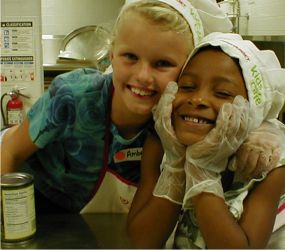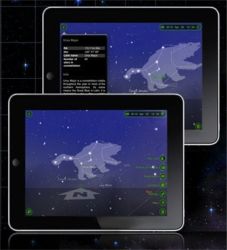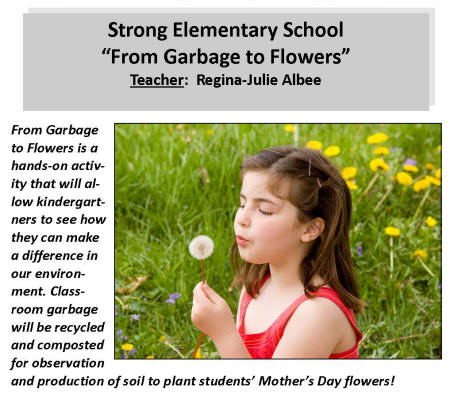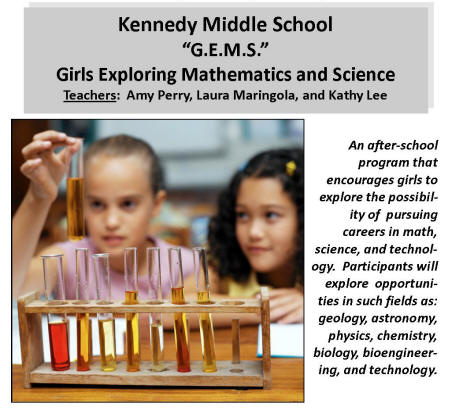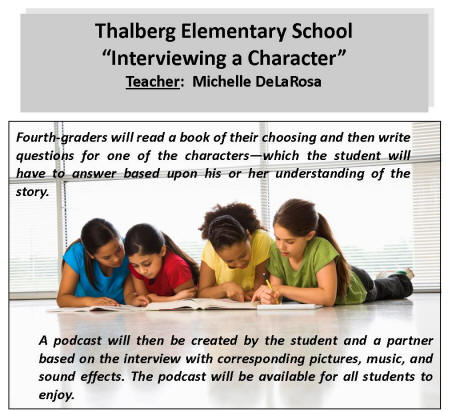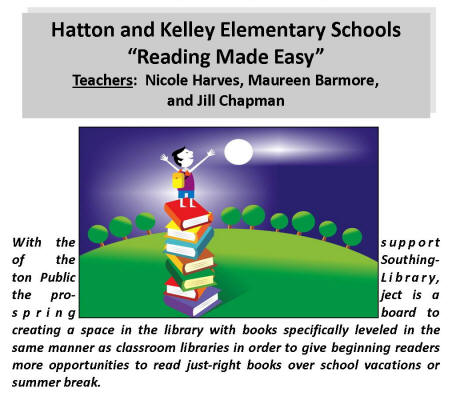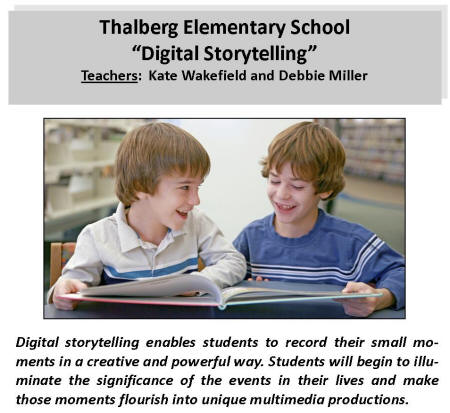|
|
|
|
|||||||||||||||||||||||||||||||||||||||||||||||||||
|
|
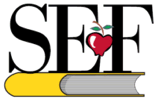 |
|
|
SOUTHINGTON EDUCATION FOUNDATION, INC. Instilling a love of learning. |
|
||||||||||||||||||||||||||||||||||||||||||||||||
|
|
|
|
|
||||||||||||||||||||||||||||||||||||||||||||||||||
|
|
Grants AwardedLearn more about our latest round of grants awarded2022Research and ProgrammingThe Southington Education Foundation awarded a mini-grant of approximately $500 to Caitlin Kelley, a teacher at Strong and South End Schools, for her project, Research and Programming. Who will be impacted? More than 160 students will be introduced to the initial project; however, it is expected to continue during subsequent years. How will students benefit? Fourth and fifth grade students from each school will extend and connect their current classroom learning with historical figures they choose to research. For example, students may choose to research people from the American Revolution, or World War II, or learn more about famous inventors, just to name a few. What do the classroom assignments look like? Collaboratively, the students do the research, create a poster with text and visuals, and then program a Dash robot. Using online resources, they record key facts about their person's life and then illustrate a timeline. At the conclusion of the project, the student’s Dash robot tells the story of the famous person's life using movement, sound, and lights for their class presentation. Students may choose to create a costume for their Dash robot. How is the project valuable? While engaged in this project, students have the opportunity to link their programming and researching skills while collaborating with others and presenting their new learning in a highly engaging and unique way. In the end, students will explain the research, programming, and presentation process, as well as understand the importance of how they are all interconnected and impact each other. Robot ProgrammingThe Southington Education Foundation awarded a mini-grant of approximately $500 to Sarah McKenney and Debbie Mauro, Flanders Elementary School teachers, for their project, Robot Programming. This project provides students the opportunity to gain experience about basic coding skills. How will students benefit? For this project, 277 students in grades K-5 will learn the creative process of coding. Educational robots bring complex science and engineering into the classroom, in a very tangible way. What do the classroom assignments look like? Using robotics, students recognize and program patterns, ensuring that robots repeat their commands. They will learn to identify a problem, develop solutions, construct a product, revise using feedback, and reflect on learning. How will students advance? Students begin at the novice level and as the skills become more complex, they focus on thinking that involves algorithms and computations. Student skill sets are tracked, and instruction is adjusted as needed. How is the project valuable? Students get a chance to see their work come to life when the robot conducts the assigned tasks. Robotics education offers an environment where all students are able to develop a level of critical thinking skills, master advanced concepts, find success and develop confidence. Student learning is evaluated and assessed for critical thinking, communication, collaboration, and creativity, all imperative for 21st century teaching and learning. 2021Diversifying our Shelves
What is the inspiration? In her application, Curtin stated that she was “applying for this grant because when I look at my students in their desks, I see a diverse set of learners hungry for new novels and realistic storylines about the world that is blooming around them. When students are presented with more diverse book choices, they will explore characters whose struggles may be similar or different than their own, which is an important reminder that each person’s life, whether fictional or real, is one of value. This will help our students craft a more inclusive, compassionate view of the world around them.” How will students benefit? For this project, students are able to access age-appropriate, award winning fiction from minority authors and/or about a character from a minority background. By June 2021, 94 Grade 7 students will increase their awareness of minority authors and/or characters from a minority background and are able to explain the importance of purposefully reading diverse literature as shown by the results of a digital student survey and anecdotal data from a classroom reflection. What do the classroom assignments look like? To prepare for a Flipgrid video, students complete weekly written responses to teacher prompts that include an analysis of the author’s life, the text’s big issues, and the theme. They organize and write the script for their book review. Students then participate in a digital sharing activity, which allows them to leave positive feedback for their classmates’ videos while expanding their knowledge of diverse authors and book titles. Why is the project valuable? Students are able to reflect on the experience and understand the importance of reading diverse young adult fiction. Who will be impacted? This project will last as long as the books do, which will be many years. As students provide feedback about the books, their teacher is able to develop book recommendations for future students getting more “just right” books into the hands of students. As Curtin stated, “this classroom library upgrade is the perfect complement to the district’s diversity curriculum, emotional intelligence goals, STEPS program, and Vision of a Graduate”.
Windows & Mirrors
What is the inspiration? “My classroom library includes many grade-level appropriate texts that act as mirrors. This grant would help expand my library to include a collection of diverse books that would act as windows for my students,” says Lenore. During the 2020-2021 year, the SEF responded to administrators’ suggestion for mini-grant opportunities to expand the diversity of teacher’s classroom libraries. How will students benefit? Butler proposed that through this grant, fifth graders will see that stories can be like windows and mirrors. The study of texts that reflect their own identities, experiences and motivations act as mirrors. The study of texts that provide insight into the identities, experiences and motivations of others act as windows. The world looks different depending on who and where you are. Students need practice understanding multiple points of view. What do the classroom assignments look like? After reading a book, students share how the book was either a window or a mirror for them. They write about how it either made them feel connected and why, or how it helped them build understanding and/or empathy. The books can be used during read-alouds, reading workshop, independent reading time, whole class reading, and book club. Responses are displayed on a hallway bulletin board. Students also record these responses via Flipgrid videos to share reading experiences with each other and the wider school community. Why is the project valuable? Reading about diverse cultures can move students towards more nuanced perceptions of the world around them. Reading and responding to stories of varied cultures can help students expand their knowledge of their world and other cultures and therefore feel more connected to others in the world, and perhaps feel less alone, while also building empathy for others. Who will be impacted? The books acquired through this grant will last for many years and effect many students. Multicultural Mentor TextsThe Southington Education Foundation awarded a $495 mini-grant to Jessica Fletcher and Gina Krar, Oshana Elementary School teachers, for their project, Multicultural Mentor Texts. The two first grade teachers are collaborating across two grant requests - this one for mentor texts, and another for classroom library books. They consulted with Stephanie Lawlor, Language Arts Coordinator, as well as searched a variety of sources and other online teacher sources to create this mentor text list. Who will benefit? Each year this award will provide anywhere from 30 to 40 children in the combined classes and for that matter, years to come. With books lasting for decades there are hundreds of students that can be impacted by this project. Why is this project valuable? This project will create opportunities for rich group discussions on making connections with characters of all races and ethnic backgrounds and celebrating student uniquenesses as well. By complementing classroom libraries with multicultural ‘just right’ leveled books, students will have multiple exposures to a variety of characters and experiences. What is the broad reach of this project? Currently the teachers are reading 2 mentor texts that lend themselves to group discussions about cultural competence. The project objective is to increase to a goal of reading 20 multicultural books across one school year which in turn will spark whole class conversations. These discussions will increase students’ cultural competence and allow them to feel comfortable discussing similarities and differences. This is one aspect of this project. Read on to learn about the second aspect.
Multicultural LibrariesThe Southington Education Foundation awarded a $524 mini-grant to Jessica Fletcher and Gina Krar, Oshana Elementary School teachers, for a second project, Multicultural Libraries. As they noted in their grant application, “We want our students to have a variety of characters with different cultural, racial, and ethnic backgrounds in their independent reading leveled books so that our students develop cultural competence even at a young age”. Who will benefit? This is a multi-layered project whose goal is to impact first graders over as many years as these books last. The teachers, with Stephanie Lawlor’s help, found comprehensive realistic fiction, multicultural, leveled set of 72 books that will be shared across the two classrooms. By adding this collection of books, the percentage of multicultural books will increase from 10% of diverse books to over 15%. The award provides anywhere from 30 to 40 children in the combined classes yearly and for that matter, years to come. With books lasting for decades there are hundreds of students that can be impacted by this project. Why is this project valuable? Using the multicultural read aloud books (reference the Multicultural Mentor Text mini grant information), students will be more apt to choose a multicultural book at their ‘just right’ level. Once again this will create opportunities for rich group discussions on making connections with characters of all races and ethnic backgrounds and celebrating our uniquenesses as well. How do first graders read these books? Students apply the daily strategy taught in their ‘just right’ books. They turn and talk to their partner, stop and jot their thoughts and reactions, make connections to the characters to their books, and predict what might come next. Students also retell their story. They apply all their new learning in these realistic fiction books.
Video Equipment for Remote Learning and 21 st Century Literacy SkillsThe Southington Education Foundation has awarded a $498 mini-gran to Ryan Hartt, John F. Kennedy Middle School teacher, for his project, Video Equipment for Remote Learning and 21 st Century Literacy Skills. The application states that technology has always been an integral approach to Hartt’s teaching social studies. He further states, “Timeless skills such as analyzing primary sources and geography are blended seamlessly with 21 st century literacy skills to create projects like podcasts, public service announcements, videos and movie trailers”. What was the inspiration? Since the pandemic, teachers have come to using
remote learning and thus relying on technology. Unable to take field trips to a museum or a historical site, Mr. Hartt shared with the SEF his belief that the creation of virtual field trips and other immersive videos for classroom use was the How will the project work? Not only will Hartt be able to create meaningful videos, but he will also be able to teach students how to use the equipment to create high quality projects and use real word skills in audio and video production. The equipment he requested will provide for higher quality videos than what can be achieved with an iPhone. What do the classroom assignments look like? Hartt states that technology skills
will prepare students for future careers. They will develop real world skills that are
applicable to virtually any job. Students will learn about technology by creating
blogs, news reports of historical events, debates, or speeches through videography. Who will be impacted? The grant funding supports digital needs. The
project serves students whether in the classroom or in distance learning
environments. Mr. Hartt’s project will impact nearly 100 students this year and More than technology, a preparation for the future: This proposal combines all the components of the Vision of a Graduate, as well as 21 st century literacy skills. In addition to academic content, it includes building skills in collaboration, critical thinking, communication, and creativity. 2020Illuminating the Essential Power of Diversity, Amy Perry, JFK Middle School - $498The Southington Education Foundation has awarded funding to Amy Perry, John F. Kennedy Middle School curriculum specialist, for her project, Illuminating the Essential Power of Diversity. Perry’s project will enhance the social studies curriculum by providing students opportunities to read fascinating stories about people of color who were American trailblazers.
Who will benefit? The award provides all JFK students in grades six through eight access to a variety of carefully-chosen books related to four units taught throughout the school year: Black History Month, Asian-Pacific American Month, Hispanic Heritage Month, and Women’s History month. During each unit students will choose a book to read about a hero they would like to learn about. The reading materials are at varying levels and will be available to students to explore throughout the year. The teachers of the JFK social studies department are committed for they see this project as valuable for many reasons.
Why is this project valuable? In the grant application Perry emphasized the value for students to understand the story of those who do not look like them. Perry pointed out that the national reckoning on race was occurring as she wrote this application. She emphasized the importance of students having books that will tell the story of the people of color, not only about their struggle for equality but also about the impact they personally had on America. What is the broad reach of this project? As Perry’s application indicated this project impacts JFK students in many ways. The project supports the Southington Public Schools' goals for diversity and inclusion. The district strives to prepare students to become productive members of society, teaching them to respect diversity while creating a sense of community. Enriching conversations will allow students to develop cultural competence and a positive racial consciousness, essential aspects of Southington’s Vision of a Graduate.
TechBot Design Collaboration Center
| ||||||||||||||||||||||||||||||||||||||||||||||||||||
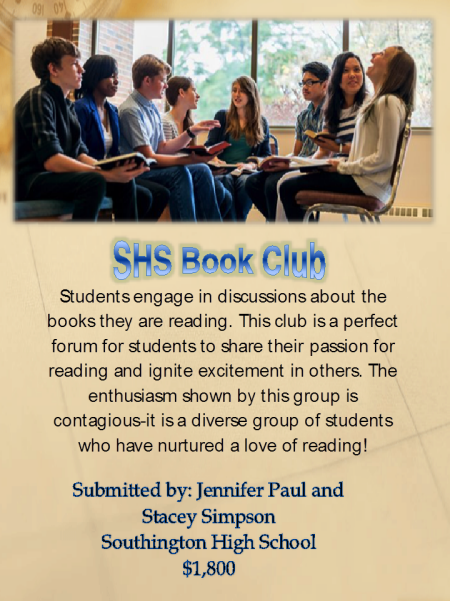 |
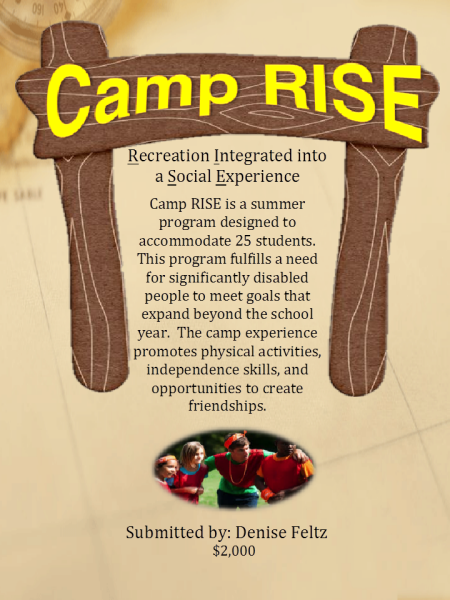 |
 |
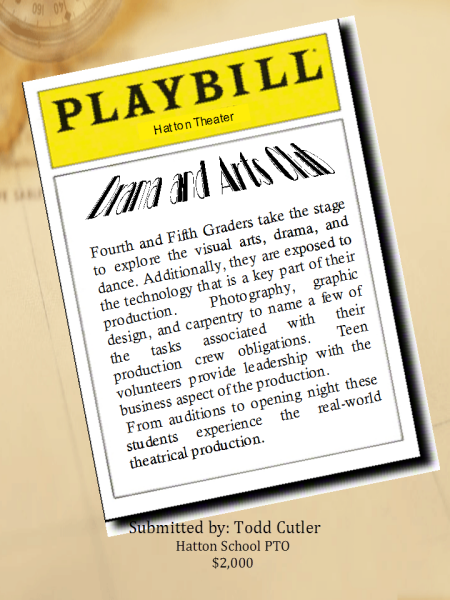 |
 |
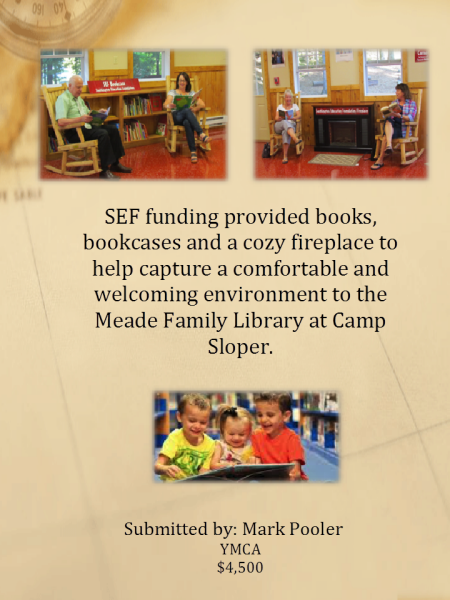 |
 |
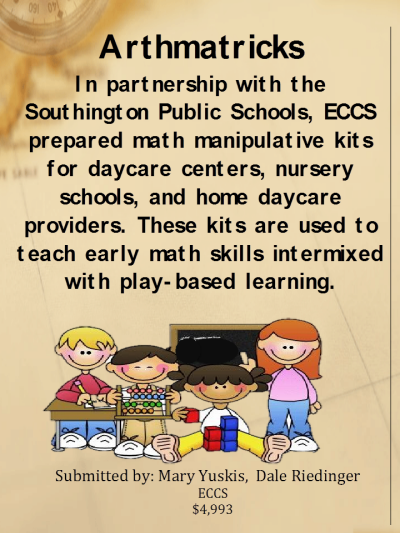 Through a $4,993 grant awarded by the Southington Education Foundation (SEF), Math
Conceptual Development kits have been purchased for every family day care
provider, nursery school and child care center in town. These math kits were
conceptualized and created as a partnership between the Southington Public
Schools (SPS) Math Coordinator's Office and the Early Childhood Collaborative
of Southington (ECCS).
Through a $4,993 grant awarded by the Southington Education Foundation (SEF), Math
Conceptual Development kits have been purchased for every family day care
provider, nursery school and child care center in town. These math kits were
conceptualized and created as a partnership between the Southington Public
Schools (SPS) Math Coordinator's Office and the Early Childhood Collaborative
of Southington (ECCS).
Directors and staff at Southington's early childcare providers were invited Sept. 14 to a workshop to learn about math skills for young children and activities to do with the math manipulatives in these kits. Dale Reidinger, the SPS Math Coordinator, identified the components, purchased the materials and will do the training. The kits contents, which were assembled by volunteers from the SEF, ECCS and SPS, include Unifix Cubes, Pattern Blocks, Attribute Blocks, dice, instructions and more.
"The Southington Education Foundation is pleased to provide funding for the Arithmatricks grant requested by the Early Childhood Collaborative of Southington," said Jan Galati of the SEF. "The Grants committee determined this project as an opportunity to provide hands on experiences in math and reasoning skills to preschoolers who will later move on to the public school system."
"Young children experience mathematics all around them helping them to make sense of their world," said Dale Reidinger.
"Some basic mathematical concepts such as patterns and sequencing develop early in both infants and toddlers with simple early games we play with them. Recognizing patterns helps them to understand how the world works and sequencing helps to develop a sense of order, logic and reason. As they play, observe and interact with others, they learn to construct mathematical ideas in very informal but important ways. In these early years they will compare size and quantity, measure, build, recognize and create patterns and shapes, and sort and classify objects by their attributes. These early experiences show us that preschool children have a natural ability and interest to engage in mathematical thinking and problem solving."
The National Council of Teachers of Mathematics and the National Association for the Education of Young Children issued a joint statement: "High quality, engaging, and accessible mathematics education for 3-to-6-year-old children is a vital foundation for future mathematics learning. Studies have shown that having knowledge of basic math concepts is strong predictor of later achievement of both math and reading.
An important educational goal is for children to have "good number sense." Children need a wide variety of experiences and activities to help them construct many ideas about numbers. They must see relationships between numbers with connections to the real world using simple tasks. Conceptual understanding of numbers includes seeing relationships between more, less or equal in a group of objects; counting and numeral recognition. Counting tells how many items there are in a group. Young children must count with objects and while counting they need to associate one number count with every one object.
Walking Trail Murals
While walking the trail through Plantsville, make sure to stop to admire the work of our talented third graders. Their mural, unveiled May 25, 2016, is located by Dean's Stove and Spa, and depicts various attractions throughout Southington.
A big shout out to the the art teachers who oversaw this project, especially Barb Szymanski, Art Teacher, Kelley, Thalberg, Plantsville and Derynoski Elementary Schools.
The project was funded by the Southington Education Foundation (SEF) and the Community Foundation of Greater New Britain in collaboration with Southington Public Schools and the New Britain Museum of American Art.
2014
Third Grade Artist in Residence Program
Together with the Community Foundation of Greater New Britain the Southington Education Foundation funded a cultural experience that reached nearly 500 third graders in the Southington Public School system during the school year 2014-2015.
The Third Grade Artist in Residence Program began with conversations among representatives from the CFGNB, SEF, school administrators and art teachers. This project was seen as a wonderful opportunity to enhance the arts experience of younger children by integrating Southington history and landscape art and, in doing so, grow students' cultural knowledge.
Through this program teachers received professional development to increase their skills and knowledge in photo collage. Students worked with their art teachers and a specialist in the art of collage to produce at least one piece of art per school. The planned field trip to the New Museum of American Art allowed young learners to view real art and align it with their learning in the classroom. The photo collages hang in all eight elementary schools where students, staff, parents and all visitors can enjoy the work of these young artists!
A special Thank You to the Art Teachers who were involved in the Photo Collage Project:
- Dana Baldwin
- Joelle Castonguay
- Luciana Florio
- Lauren Klein
- Jessica Leiss
- Barbara Szymanski
Kudos also to Karen Smith, past Southington Assistant Superintendent and Jan Verderame, Derynoski Elementary School principal, who together initiated and oversaw this project throughout its duration.
Jessica Leiss will join the art teachers as they take part in the 2015-2016 Artist in Residence Project, jointly supported by the SEF and the CFGNB.
| The Community Foundation of Greater New Britain and the Southington Education
Foundation team up to provide art lessons for every third-grader. Story by: Farrah Duffany/Record-Journal fduffany@record-journal.com (203) 317-2212 Twitter: @FollowingFarrah All 475 students from the eight elementary schools visited the New Britain Museum of American Art in the spring and had in-school, hands-on art lessons by an artist in residence from the museum. Students created Connecticut landscapes, which ties into the third grade curriculum. "The New Britain Museum of Art is just a gem in our back yard," said Jan Galati, chairman of the Southington Education Foundation. "Our mission is to expand learning experiences for students with things that are exciting, creative, and hands on." About $9,000 of the $24,875 in grant funding for the program came from the
Southington Education Foundation and the rest from the Community Foundation of
Greater New Britain. The education foundation is a non-profit dedicated to
raising funds for school programs. The community foundation works with Berlin,
New Britain, Plainville, and Southington to raise funds and develop
partnerships. "This is an example where we want to support the arts as well," said Alan
DeBisschop, past treasurer of the Southington Education Foundation. |
First LEGO League
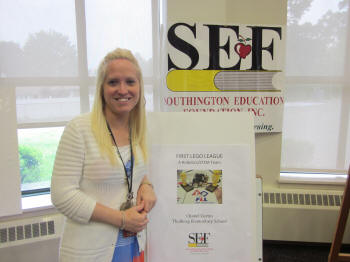 Chanel Curtin, a teacher
at Thalberg School was awarded a grant which allows her to start a robotics team
next fall through the national program First Lego League. The interest among
fourth grade students was so amazing that Curtin needed to devise an application
process to narrow the field of candidates. The FLL team is comprised of 10
fourth-grade students whose mission is to construct a robot that will maneuver
through an obstacle course. Each year a new challenge is presented to FLL teams
and next December a competition will be held in Berlin. According to competition
rules, points are awarded for each robot's performance which ultimately results
in its placement in the competition. Curtin explained that robotics fosters
independent thinking and problem solving skills and team members will be able to
continue their interest in robotics at the middle school and high school levels.
Chanel Curtin, a teacher
at Thalberg School was awarded a grant which allows her to start a robotics team
next fall through the national program First Lego League. The interest among
fourth grade students was so amazing that Curtin needed to devise an application
process to narrow the field of candidates. The FLL team is comprised of 10
fourth-grade students whose mission is to construct a robot that will maneuver
through an obstacle course. Each year a new challenge is presented to FLL teams
and next December a competition will be held in Berlin. According to competition
rules, points are awarded for each robot's performance which ultimately results
in its placement in the competition. Curtin explained that robotics fosters
independent thinking and problem solving skills and team members will be able to
continue their interest in robotics at the middle school and high school levels.
Indoor Organic Vegetable Garden
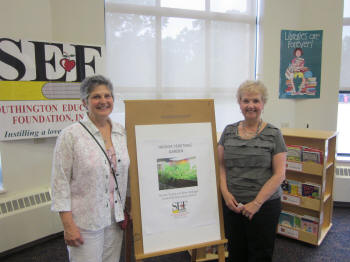 At South End
School Marion Virello, the food services manager, and Ellen Bellinger, a first
grade teacher, combined to create an indoor organic vegetable garden, an
activity that they had heard about in New York City schools. Virello reported
that it took about 20 hours to complete assembly of the eight-foot long raised
beds that are housed in the cafeteria for all students to view. Once the
construction was complete the students in the garden club set to work to plant
seeds in soil cubes placed under fluorescent lighting. Each day at lunch
students are able to hop up on benches to view the changes. The grant recipients
expect students to learn where vegetables came from, plant and maintain a
garden, and enjoy vegetables. Right now Bellinger said that the growth is slow
and that there is a bit of a learning curve. However, she said it is a garden
that will go on and on.
At South End
School Marion Virello, the food services manager, and Ellen Bellinger, a first
grade teacher, combined to create an indoor organic vegetable garden, an
activity that they had heard about in New York City schools. Virello reported
that it took about 20 hours to complete assembly of the eight-foot long raised
beds that are housed in the cafeteria for all students to view. Once the
construction was complete the students in the garden club set to work to plant
seeds in soil cubes placed under fluorescent lighting. Each day at lunch
students are able to hop up on benches to view the changes. The grant recipients
expect students to learn where vegetables came from, plant and maintain a
garden, and enjoy vegetables. Right now Bellinger said that the growth is slow
and that there is a bit of a learning curve. However, she said it is a garden
that will go on and on.
Each grant incorporates at least two of the STEM disciplines (science, technology, engineering and mathematics) and together $4,000 was awarded to the educators for their projects. To date the SEF has awarded $78,000 in grants and written $130,000 in checks for various grants, programs and initiative over the past five years.
Read the following news stories about these grants:
- Foundation Hands Out More Grants (Southington Observer)
- Southington Education Foundation celebrates grant-funded projects (Record Journal)
- Grants Awarded to Innovative Projects in Southington (Hartford Courant)
2013
The SEF is proud to have awarded close to $6,000 in grant funding to our Southington educators to help them in their mission to provide the best educational opportunities to our school children.
| Derynoski Elementary School speech teacher Jane Syme was
awarded a $1,500 grant that enhances speech and language services for
students in kindergarten through grade 5. The program, titled Apps that
Focus on Social Skills on Two iPads, will enable Syme to utilize
innovative applications available on the iPad to motivate and engage
students both with regard to communication and social skills to ultimately
improve social interaction. "There are a multitude of programs and activities available using the iPad and expanding our applications will be a goal to target not only special education students but all students who require this support," said Syme. "Having these programs on an iPad provides a portable means for service delivery in diverse settings." Syme noted in her grant application that children with speech and or language disorders frequently do not perform at grade level. "Impairment includes reading, understanding and expressing language, inability to process social cues and difficulty interacting with peers," she wrote. |
| South End Elementary School teacher Paula Gorham was
awarded a grant for her kindergarten program titled An Interactive
Storytelling Experience. South End's youngest learners will have the
opportunity to use multimedia, materials and props as they retell or
relive the stories in their favorite books based on their own real ‐ life
experiences. Students will utilize a digital storytelling program, Pixie,
and storytelling props as they develop their use language as it relates to
storytelling.
"My students enter the classroom at the beginning of the school year with many different experiences with literature," explained Gorham. "As their teacher, it is my responsibility to identify what they know and help them grow as readers. Instilling a love of books and the stories that they hold is the first step in raising readers." Gorham further noted that she intends to have her students perform and retell some of the stories for other South End classes. "They will act out scenes, draw pictures and create digital stories. We will meet with the intermediate students during our book buddies program and at that time the students will retell their stories using our new materials." This is Gorham's second grant. During the SEF's last round of grant funding during the start of the 2012 ‐ 2013 school year, Gorham received funding for a pilot program at South End and Kelley Elementary Schools titled Countdown to Kindergarten. That initiative aids families of incoming kindergartners in preparing them for the rigorous kindergarten curriculum by providing a "bag of tools" for families to use in the months between kindergarten registration and the first days of school. |
| Kelley and Plantsville Elementary School music teacher
Katherine Diaz was awarded a grant to purchase West African
percussion instruments for a program that offers a multitude of
learning experiences for young musicians. Students in grades 3, 4 and
5 in both schools will learn a particular style of traditional West
African music, song and dance called "Gahu." Diaz will form ensembles
who will learn to play various instruments such as the Balafon and the
Boba.
Besides integration of the West African music style in the general music curriculum, Diaz said she would also be forming an after‐school or recess group. A culminating performance will take place at each school to showcase the project. "The West African Percussion Ensemble will fulfill a variety of academic, social and cultural needs of our students in Southington Public Schools," said Diaz. "Academically, the students in grades 3, 4 and 5 will be participating in a rigorous but accessible ensemble heightening their listening/responding, rhythmic, creative, performance and technical needs in both instrumental and vocal music." Diaz further noted that she had a positive experience learning Gahu drumming during her graduate classes and felt "enriched as a person, building my musicianship through the higher level improvisations you can create in this style of music." |
| Kennedy Middle School mathematics teacher Amy Perry was
awarded two grants, Exploring Middle School Mathematics with Nintendo Wii
and Singin' & Signin'.
The Mathematics and Nintendo grant will impact all students in Grade 7 and Perry said she would offer the program to interested sixth ‐ and eighth ‐ grade teachers as well. "Engaging students in meaningful and fun mathematics can be accomplished utilizing the Nintendo Wii through interdisciplinary units and differentiated instruction for seventh ‐ grade students," she said. "Additionally, I will incorporate more rigor into the lessons by integrating graphing calculators, computer software and Internet resources to help build students' 21 st century skills." Perry's second grant, Singin' and Signin', is also a math program designed for interactive classrooms. The program teaches more than 50 complex math formulas to childhood songs and chants, using signs and gestures that can easily adapt to the district's curriculum. "The program maximizes student engagement, raises standardized test scores, addresses all learning styles and is award ‐ winning," said Perry. "The hope is that students will be engaged in the lesson and that they will have higher retention rates of mathematical formulas." The Kennedy grants were supplemented by a school‐designated grant funded by the Veilleux family, who donated monies during the SEF's Fan of the Foundation Gala in October 2012. |
| DePaolo Middle School teacher Betty Swist was awarded a
grant for her Whisperphones for the Improvement of Language and Literacy
proposal. The Whisperphones grant will impact students in grades 6, 7 and 8
as all will have access to Whisperphones, which are acoustic feedback
devices that provide students the ability to improve their listening, speech
and reading skills. Students speak into a mouthpiece and their voice is be
channeled directly into their ears via headpieces, thus enabling the child
to hear his or her own voice clearly and loudly.
"This project is geared towards using auditory feedback devices to enhance language learning and literacy for all students who struggle with reading and communication," noted Swist in her grant application. "Overall, these devices will be an essential tool to build confidence in those students who struggle to communicate openly in the classroom setting, and enhance their ability to read proficiently." With the SEF grant money, Swist will purchase 24 Whisperphones, adding to the five already in use at the school. |
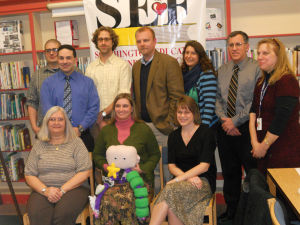
Hands-On Learning in Science and Technology: Producing Biofuel from Algae
Richard Niro, Dave DeStefano, Jesse Quinn, Justin Mirante, Patrick O'Keefe, Troy
Schinkel and Sal Spagna
Southington High School
This $3,300 grant will engage students across the spectrum and teach the fundamentals of science and technology.
The program will involve the study of alternate energy sources - specifically, the use of common algae as biotechnology to convert the radiation of the sun into energy-rich oils and ultimately biodiesel.
"While the science, vocational, agriculture and technology education students at Southington High School are well grounded in classroom learning, they lack such a broad, engaging, collaborative project to apply their knowledge and skills in the context of relevant, real-world problem," states the grant application.
Several classes will be involved in the program. AP Biology students will cultivate algae, honors and AP Chemistry classes will remove the desired oils from the algae and AP Environmental Science students will produce biodiesel from the algae-grown oil. Also involved will be technology education students, including Project Lead the Way, who will work to increase the biodiesel production into large batches. Vocational agriculture students will test the products in diesel engines in the motor laboratory.
The entire project will be coordinated by a group of interested students, the BioEnergy Project, who will liaison between the various teachers, students and classrooms.
The SHS grant was supplemented by a school-designated grant funded by the Peccerillo family, who donated monies during the SEF's Fan of the Foundation Gala in October.
Countdown to Kindergarten
Paula Gorham
South End/Kelley Elementary School
This $700 grant will pilot a program that will aid families of incoming kindergartners in preparing them for the rigorous kindergarten curriculum.
The program will provide a "bag of tools" to families to use in the months between kindergarten registration and the first days of school. Included in a canvas bag will be an ABC book, name tags, letter formation charts, white boards and markers, a library card and more.
"As a kindergarten teacher, I frequently heard from parents that they didn't know what they could do with their preschooler to help better prepare him or her for kindergarten," wrote Paula Gorham in her grant application. "We, as a district, know that we need to get information about kindergarten expectations to parents prior to the beginning of the school year."
An important component of the program is a mandatory meeting with a literacy teacher to explain to parents how to use the tools provided in the bag. Parents will receive their bags in March during registration time. An evening workshop will also be offered to provide instruction.
The Kelley Elementary School grant was funded in part by a school-designated grant generously donated by Gerald and Susanne Veilleux during the SEF's Fan of the Foundation Gala in October.
Ukulele Buddies
Mary Jane Sullivan, music teacher
William Strong Elementary School
This $4,000 grant will connect third-graders to their grandparents and other senior citizens in the community.
The program brings grandparents and other seniors into a third-grade music class for a semester to learn songs with their student "buddies." After learning to sing the songs, seniors and their buddies will then learn how to accompany those songs on ukuleles.
"My most enthusiastic audience has always been my annual "Grandparent's Program" in April. Every year, grandparents say things like, "I wish I could be in your music class" or "Could you teach me to sing, too?" wrote Mary Jane Sullivan in her grant application.
According to Sullivan, the Ukulele Buddy program is a great way to extend quality musical experiences to seniors in the Southington community. It also enhances the music education experience for third-graders by exposing them to playing a string instrument in addition to the recorder.
The program will eventually expand to grades four and five as well.
Sullivan has already created flyers inviting interested senior citizens to Tuesday morning music classes from Feb. 5 through April 9. There are 50 openings and three different class options.
Tying Together Oral Language, Literacy, & Core State Standards with Braidy
Julie Zellner
Thalberg Elementary School
This $1,500 grant will help kindergartners with their story retelling skills.
According to Zellner, a student's ability to retell stories from their life experiences and what they read is crucial for academic success.
With the use of an interactive doll named Braidy, students will learn to present stories and transfer information by tapping into their working memory and the teaching of grammar components. Students will each receive a small version of Braidy to assist with their retell of stories.
"Our kindergarten students are in need of enriching language and structure in order to meet the literacy curriculum and standards for the Common Core. In school districts where Braidy is used, classrooms are filled with children using language necessary to do retells and using vocabulary that is semantically rich," Julie Zellner states in her grant application.
Kindergarten teachers will receive training in the use of Braidy, which has been in classrooms for 20 years.
The awarding of this grant was supplemented by a school-designated grant donated by the Possidento family, whose children attend Thalberg. Steve and Stephanie Possidento funded a school-designated grant during the SEF's Fan of the Foundation Gala in October.
Young Artists and Entrepreneurs
Michelle Ginand, William Walker and MaryBeth Eckert
Derynoski Elementary School
This $3,000 grant will provide a real-world business experience to students. According to the grant application, the program will ultimately impact students in Kindergarten through Grade 5.
Students will garner first-hand experience in both creating a business and real-world career opportunities related to the arts. To start, the program will involve all fourth-grade classrooms. Students will create a product in art class, a business plan with their classroom teacher and a marketing plan with the library specialist to sell the product.
The funds will be used to purchase equipment and supplies to establish the program. Eventually, the program will generate the revenue necessary to sustain itself in future years.
"One idea for future development of the program is to have fourth-graders create the product and the business teams and the fifth-grade create marketing teams that develop sales pitches that will be presented to the fourth grade. The fourth grade business teams will then choose the marketing team they want to work with," states the grant application.
Additionally, the equipment for this program will serve to enhance opportunities for after-school clubs.
Student Savers
Joanne Grant
DePaolo Middle School
This is the second time that Joanne Grant has been awarded funding by the SEF. She also won a $500 grant for her program titled Movie Club: Lights-Camera-Action.
This project will encourage students to develop an understanding of the importance of saving money and planning for future purchases. A bank will be established to help students save their spare change. In addition, students can withdraw amounts when needed for school trips or to participate in fundraising activities such as hat day, pajama day, etc. Students will be given a passport to keep track of all deposits and withdrawals.
"Students will be trained to take in and record the money to the account," wrote Joanne Grant in her application. "Monthly statements will be sent to the students to remind them of their transactions and their current balances."
The savings program will be offered to all students who attend the school.
The DePaolo Middle School grant was funded in part by a school-designated grant generously donated by Gerald and Susanne Veilleux during the SEF's Fan of the Foundation Gala in October
2012
The SEF is proud to have awarded another round of grant funding to our Southington educators to help them in their mission to provide the best educational opportunities to our school children.
|
|
Four grants were awarded totaling nearly $10,000:
- APP-TITUDE for ELL's SUCCESS
Linda Clock, Town-wide ELL Coordinator - Sustainable Learning in an Outdoor Classroom
Linda Bass-Reilly, Thalberg School - Good Morning Strong School
Lenore Butler and Paula Knight, Strong Elementary School - What's Cooking at Thalberg?
Michelle De La Rosa, Nhi Michaud and Chanel Curtin, Thalberg Elementary School
More than 50 teachers have received grants and each school in our district has been the recipient of at least two grants.
The Southington Education Foundation, Inc. awarded a fifth round of grants at a reception January 19, 2012 at JFK Middle School:
2011
The Southington Education Foundation, Inc. announced the names of four teachers who have been approved for grants during the organization's fourth round of grant funding at a Grant Awards Reception, May 26, at Southington High School:
|
|
|
The Southington Education Foundation, Inc. awarded a third round of grants at a reception January 20, 2011 at Plantsville Elementary School:
|
|
|
|
|
2010
The Southington Education Foundation awarded a second round of mini-grants at a reception June 10, 2010 at Kelley Elementary School:
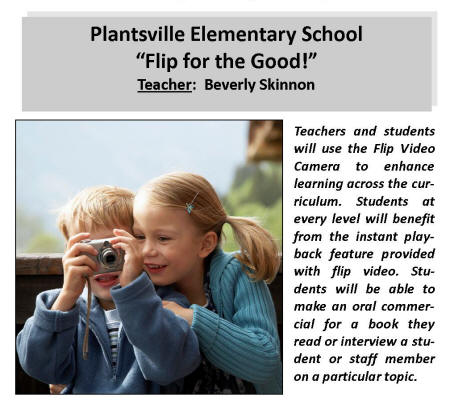 |
|
|
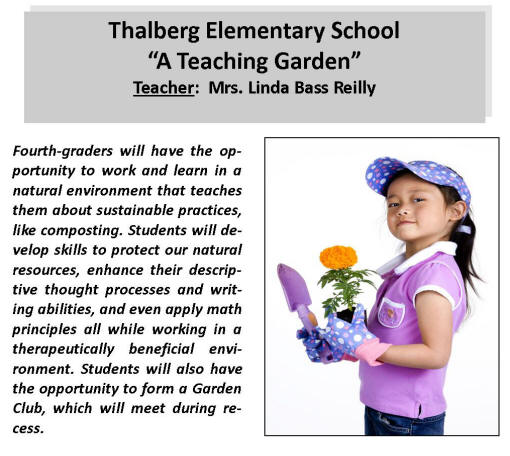 |
|
|
|
|
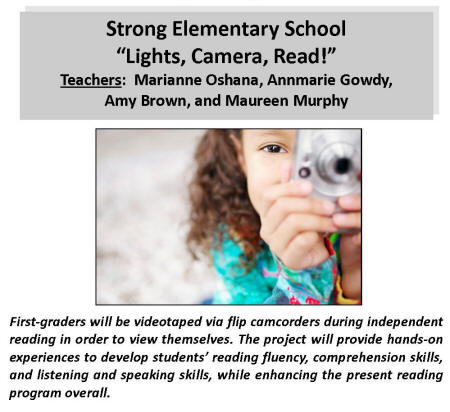 |
|
|
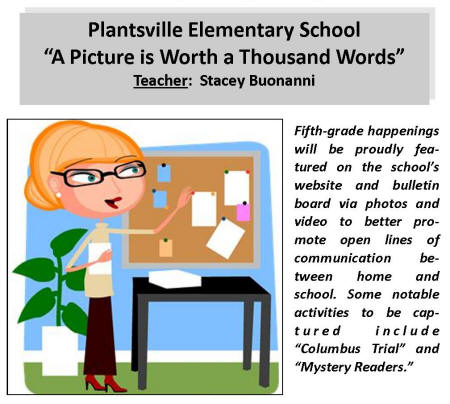 |
|
|
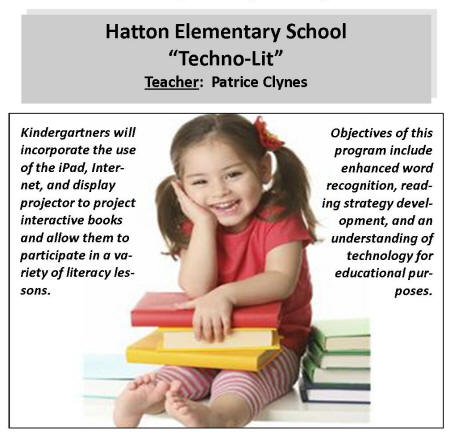 |
|
|
The Southington Education Foundation funded three innovative and constructive grants following an anonymous donation of $10,000.
With $5,000 of the donation, Southington High School will be outfitted with a TI-Nspire Classroom, which combines learning handhelds and computer software with assessment tools that gauge student understanding within an interactive classroom. The technology will be utilized extensively in five sections of precalculus classes and at least one section of advanced placement statistics at SHS. Additional math classes will also benefit from the technology, which includes SmartBoards, LCD projectors, computer software and calculators, because at least two classrooms will be equipped with the apparatus, according to SHS Math Department Chairman Robert Lasbury.
The Kennedy Middle School Music Department received $2,500 to be used to promote and inspire jazz music. Specifically recognized by the donor was Tim Johnson, who directs the school's band. The money will go toward the purchase of sound equipment, which students will learn to set up and operate for school concerts. Students will also learn how to make CDs after recording their concerts.
The final $2,500 was earmarked for the SHS Construction and Manufacturing Career Advisory Board, which sponsors expos for students to meet representatives from different trade industries to discuss career options. The donation specifically cited John Ellsworth and Nancy Cheiro for their respective service to the school system and its students.
On February 5, 2010, SEF awarded the first round of mini-grants to educators during a reception at Thalberg School:
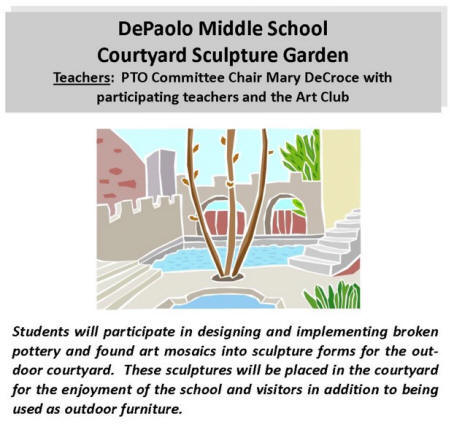 |
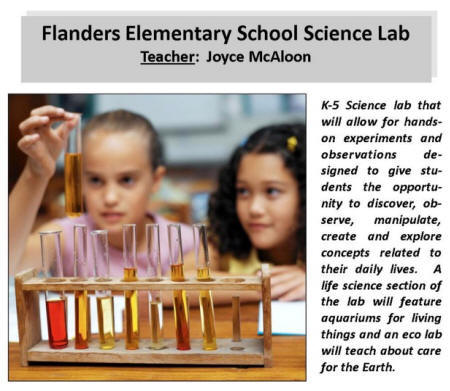 |
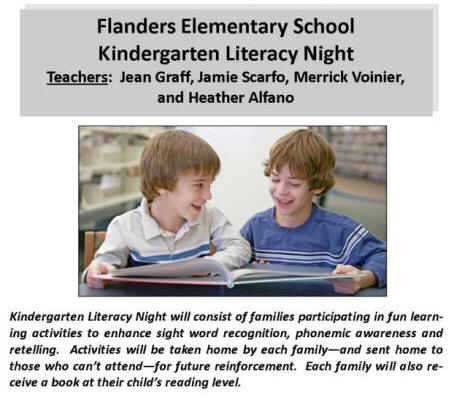 |
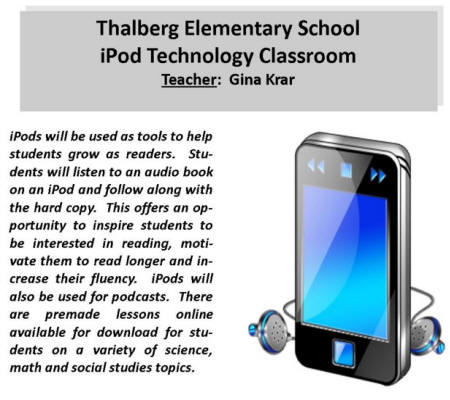 |
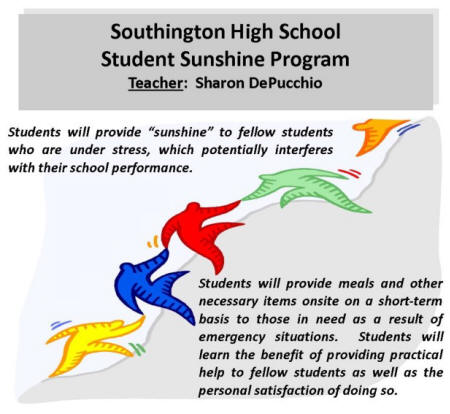 |
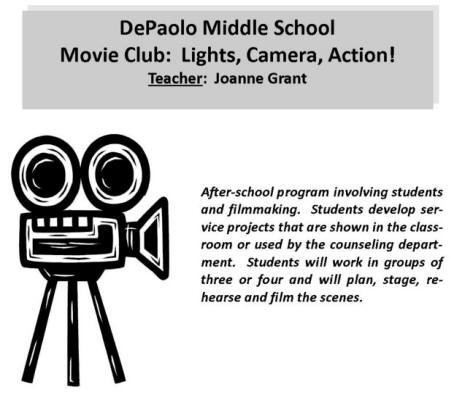 |
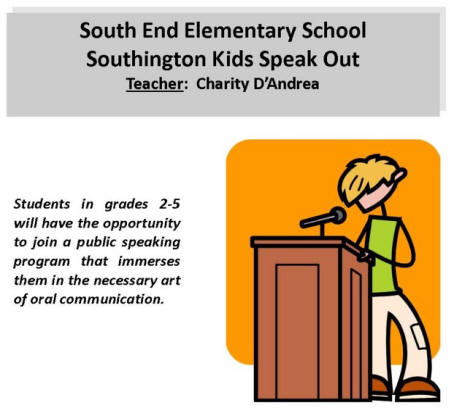 |
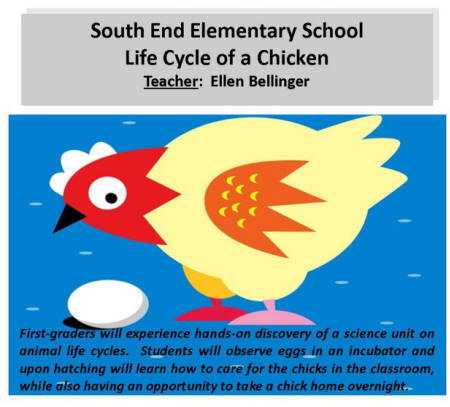 Click here for photos! |
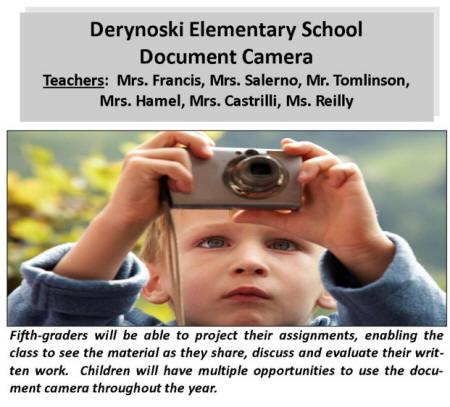 |
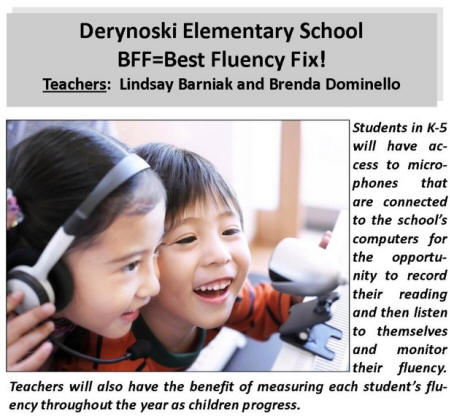 |
If you have further questions regarding applying for grants through the Southington Education Foundation, click here.
Southington Education
Foundation
P.O. Box 42
Southington, CT 06489
SEF.Donations@gmail.com
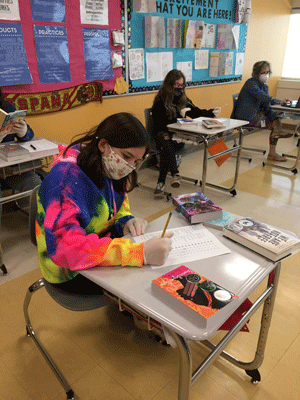 The Southington Education Foundation has awarded a $438 mini-grant to Elizabeth Curtin, DePaolo Middle School teacher, for her project, Diversifying our Shelves. Curtin’s grant requested a selection of culturally diverse books. During the 2020-2021 year, the SEF responded to administrators’ suggestion for mini-grant opportunities to expand the diversity of teacher’s classroom libraries.
The Southington Education Foundation has awarded a $438 mini-grant to Elizabeth Curtin, DePaolo Middle School teacher, for her project, Diversifying our Shelves. Curtin’s grant requested a selection of culturally diverse books. During the 2020-2021 year, the SEF responded to administrators’ suggestion for mini-grant opportunities to expand the diversity of teacher’s classroom libraries. 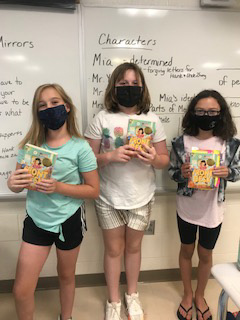 The Southington Education Foundation awarded a $499 mini-grant to Lenore Butler, Strong Elementary School teacher, for her project, Windows and Mirrors. Butler’s grant requested a selection of culturally diverse books to not only enhance her students’ literacy skills, but also expand their perception of the world today.
The Southington Education Foundation awarded a $499 mini-grant to Lenore Butler, Strong Elementary School teacher, for her project, Windows and Mirrors. Butler’s grant requested a selection of culturally diverse books to not only enhance her students’ literacy skills, but also expand their perception of the world today.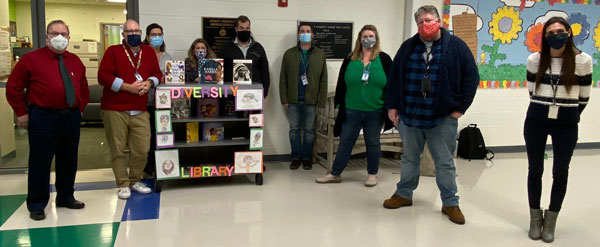
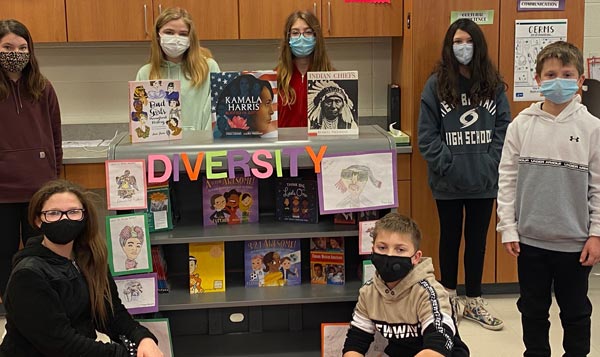
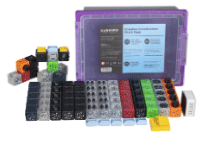 The Importance of Reaching More Students in Elementary Classes:
The Importance of Reaching More Students in Elementary Classes: 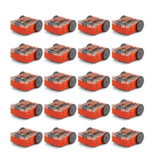 The Materials:
The Materials: 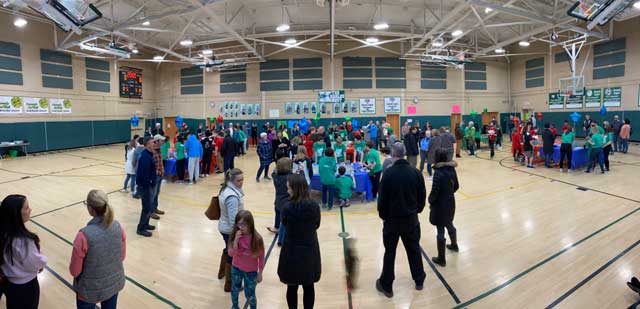
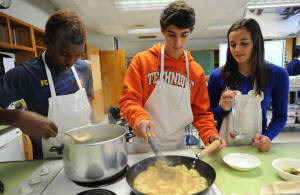 The project provides a six-week program to students who are interested in
employment in the culinary field after they finish high school. The course will
teach cooking skills and techniques that will prepare the students for
employment in the food service industry. In addition, the students will be
educated about food safety as well as applicable state and Federal regulations.
The project provides a six-week program to students who are interested in
employment in the culinary field after they finish high school. The course will
teach cooking skills and techniques that will prepare the students for
employment in the food service industry. In addition, the students will be
educated about food safety as well as applicable state and Federal regulations.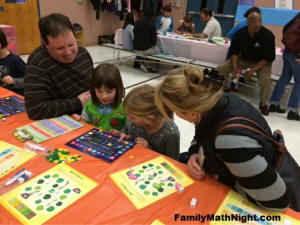 Zappone reported a great interest from the Southington
community to learn more about how math is being taught in school now, as
compared to the past. There are many misconceptions prevalent regarding the
intentions and philosophies behind the Common Core State Standards for
mathematics.
Zappone reported a great interest from the Southington
community to learn more about how math is being taught in school now, as
compared to the past. There are many misconceptions prevalent regarding the
intentions and philosophies behind the Common Core State Standards for
mathematics. Beehives - Apiculture in Agriculture:
Beehives - Apiculture in Agriculture: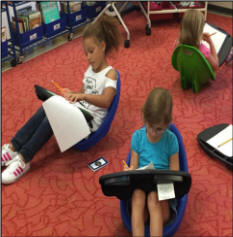 Flexible Seating in the Classroom
Flexible Seating in the Classroom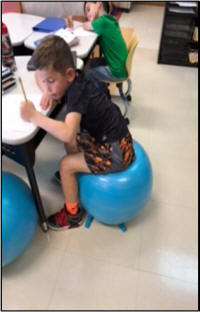
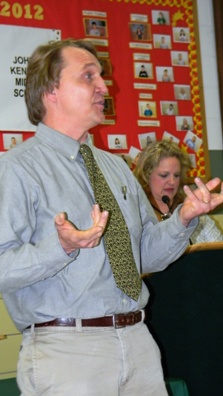 Electromagnetic
Propulsion
Electromagnetic
Propulsion African
Drumming
African
Drumming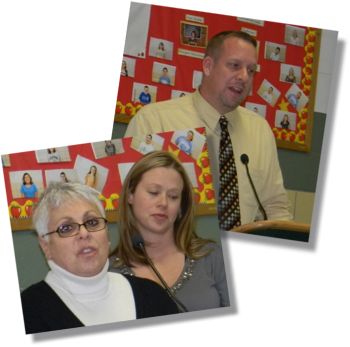
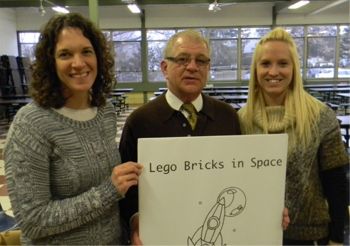 LEGO
Bricks in Space
LEGO
Bricks in Space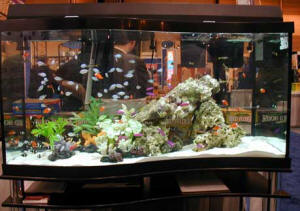 Salt
Water Aquarium Investigations
Salt
Water Aquarium Investigations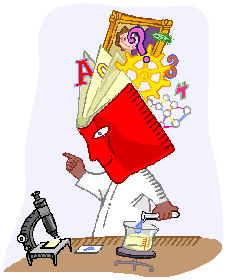
 Take a Chance on Me
Take a Chance on Me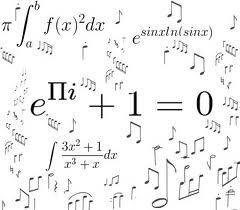 The
Mysteries of Math in Music
The
Mysteries of Math in Music
